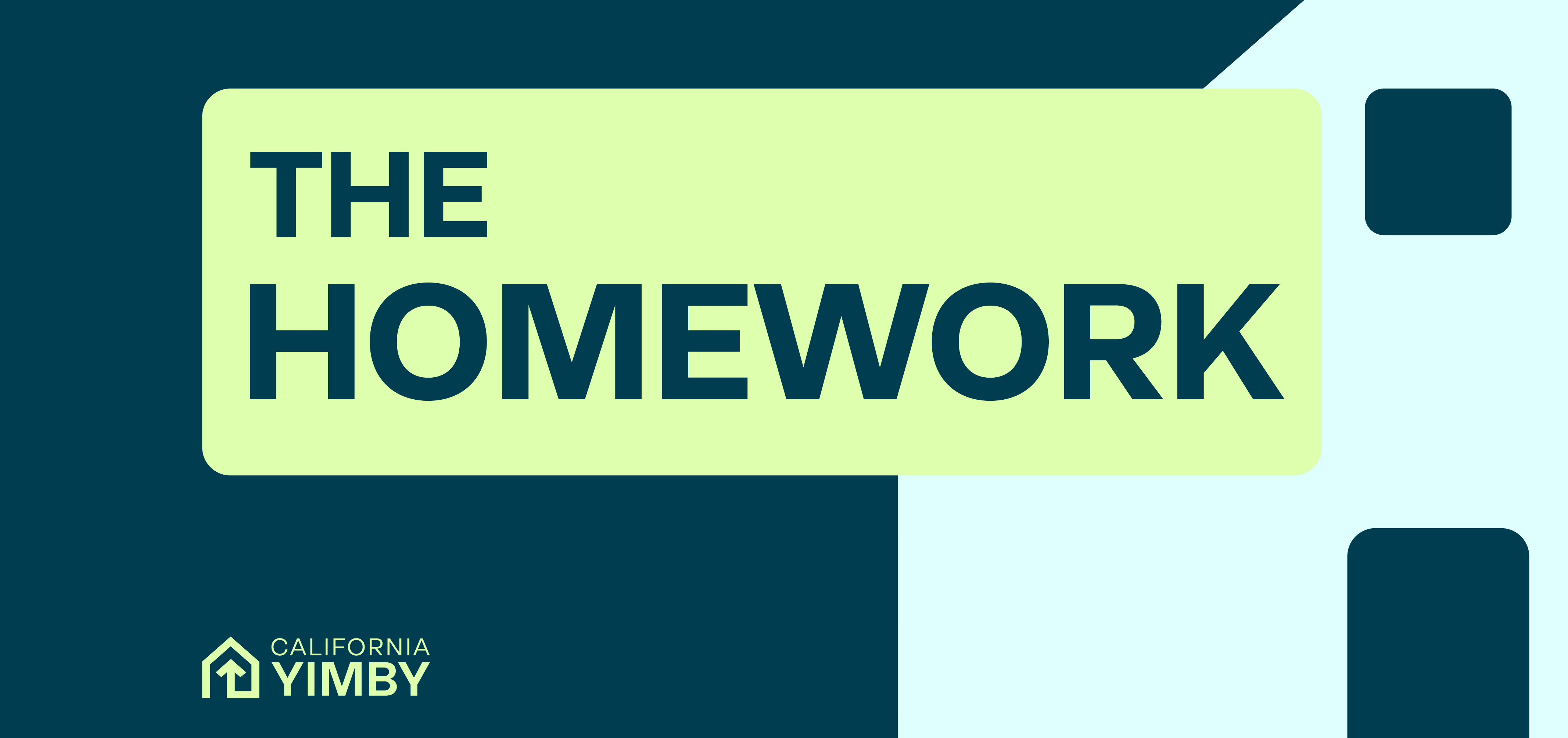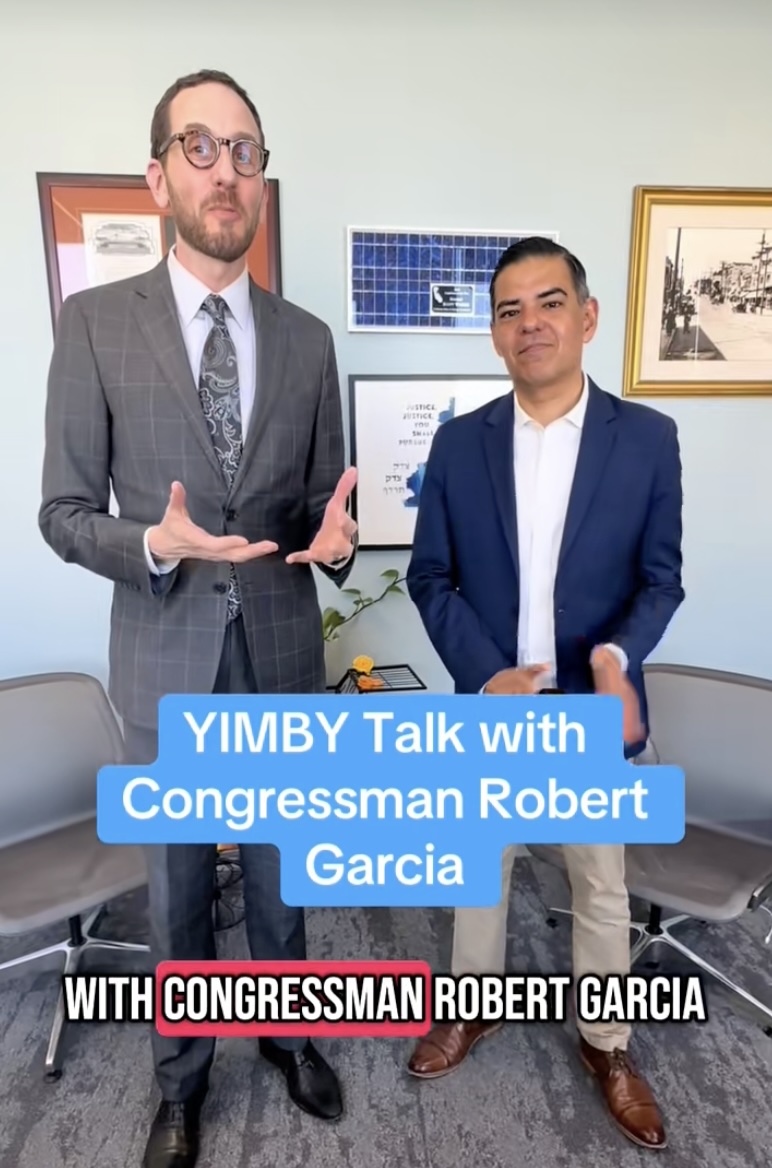The Homework: May 5, 2025

Welcome to the May 5, 2025 Main edition of The Homework, the official newsletter of California YIMBY — legislative updates, news clips, housing research and analysis, and the latest writings from the California YIMBY team.
News from Sacramento
Major Progress on Pro-Housing Bills
Coming out of the first wave of committee hearings in the Legislature, nearly all of California YIMBY’s sponsored bills have advanced and several are now heading to Appropriations committees in both chambers. Bills that were not referred to the Appropriations committees, or that win their votes in Appropriations, will head to the floor prior to crossing over to the other chamber for concurrence.
California YIMBY extends our deepest gratitude to our grassroots supporters, our legislative partners and allies, and especially to the Legislative leaders who stepped up to support a pro-housing, affordable and inclusive California.
The current status of our sponsored bills:
- Referred to Appropriations Committees:
- SB 79 (Wiener): Will make it faster and easier to build multi-family housing near transit stops, like train and rapid bus lines, by making it legal for more homes to be built in these areas, and streamlining existing permit review processes.
- AB 609 (Wicks): Creates a CEQA exemption for environmentally-friendly housing located in existing urban areas (“infill housing”).
- AB 1308 (Hoover): Speeds up the post-entitlement process by requiring building departments to provide estimated timeframes for permit inspections and allowing applicants to contract with private professionals for inspections.
- AB 413 (Fong): Requires the California Department of Housing & Community Development (HCD) to translate key state housing guidelines and handbooks into the non-English languages commonly spoken in California.
- AB 595 (Carrillo): Creates more pathways to affordable homeownership for working families and communities of color by providing tax credits for the construction of for-sale homes affordable to Californians who earn moderate income.
- Pending Floor vote:
- AB 1061 (Quirk-Silva): Makes it easier to increase the number of homes—including duplexes—in single-family neighborhoods by allowing the California HOME Act (SB 9, 2021) to be used in historic districts.
- Crossed to the other chamber:
- AB 1154 (Juan Carrillo): Removes owner-occupancy requirements for “junior” ADUs (ADUs built within an existing home) that do not share sanitation facilities with the existing structure. It will also exempt small ADUs under 500 square feet from parking requirements, similar to existing exemption for JADUs.
- AB 253 (Ward): Speeds up the approval process for new homes by allowing home builders to hire a licensed and certified third-party reviewer for review of housing permit applications if the local government cannot or does not complete their permit review within 30 days.
Our only sponsored bill still pending a policy committee hearing is SB 9 (Arreguín), which ensures that local laws governing the construction of accessory dwelling units (ADUs) align with state law, and provides a pathway to eliminate unlawful local barriers to ADUs. The bill will be heard in early May in the Senate Local Government Committee.
On a down note, SB 677 (Wiener), which would have strengthened and improved both SB 9 and SB 423, did not pass the Senate Housing Committee. In addition, our bill – SB 315 (Grayson), which would impose limits on parks fees and establish greater oversight and accountability in the application of these fees, has officially become a two-year bill.
Fast-Track Housing Update
In March, Assemblymember Wicks, joined by a bipartisan coalition of legislators, introduced the Fast Track Housing Package: over 20 bills designed to streamline approvals and accelerate the construction of much-needed housing. The package focuses on a set of targeted interventions to help make housing more affordable, and ensure that projects move forward without unnecessary delays that drive up costs.
Nearly all of the bills in the package have passed their policy committees, and have been referred to the Appropriations Committee.To learn more about the bills, visit the official Fast Track Housing Package website.
To stay current on what housing bills California YIMBY is sponsoring and supporting, you can now use our Abstract link to track with us.
Be sure to stay tuned for future editions of The Homework (and follow California YIMBY’s Twitter and Bluesky channels, @cayimby and cayimby.bsky.social), to stay current on housing policy research, news, and legislative updates.
Housing Research & Analysis
The Unintended Consequence of Law: Measure ULA, the Housing Killer
New research from UCLA has found that Los Angeles Measure ULA, which imposes a 4 percent tax on property sales over $5 million (5.5 percent above $10M) and allocates the revenue to subsidized affordable housing, has significantly reduced property sales and undercut its ability to raise revenues for urgently-needed subsidized homes.
In “The Unintended Consequences of Measure ULA,” Michael Manville (UCLA Lewis Center for Regional Policy Studies) and Mott Smith (USC Price School of Public Policy) compared property sales in LA with neighboring cities before and after April 2023 to isolate the tax’s specific effects.
Key Takeaways:
- Contrary to its marketing, ULA is not actually a “mansion tax.” Most high-dollar (>$5 million) property transactions in Los Angeles are apartment buildings, commercial properties, and industrial sites, not luxury single family homes.
- Measure ULA has reduced apartment, commercial, and industrial property sales by 30-50 percent, thereby also reducing the number of sites available for new, subsidized multi-family housing.
- The resulting drop in property tax revenue has cost schools, the city, and county about $25 million yearly.
If You Tax the Things You Want Less of …
Los Angeles voters passed Measure ULA in 2022 to tax real estate sales over $5 million in order to fund subsidized housing programs. But new research from UCLA and RAND finds that the policy may be slowing the growth of the city’s housing supply instead.
Since the tax took effect in April 2023, Los Angeles has seen fewer large apartment buildings get built – especially the kind that include affordable homes without needing public subsidy.In Taxing Tomorrow: Measure ULA’s Impact on Multifamily Housing Production and Potential Reforms, Jason Ward (RAND) and Shane Phillips (UCLA Lewis Center) studied what happened to land sales, construction, and affordable housing development once the tax was in place. Their findings show that ULA is significantly reducing multifamily housing development.
Key Takeaways:
- Permits for apartment buildings with 20 or more homes fell by 1,910 homes annually after ULA was implemented.
- The tax on multifamily sales prevents the creation of at least 168 below-market homes each year—units that would’ve been built in private, mixed-income projects without ULA.
- ULA raises $29 million annually from new multifamily sales, enough to fund around 70 homes, but the policy blocks over 100 affordable homes annually.
Houser Headlines
- Opinion: Transit-oriented housing bill could transform Silicon Valley’s landscape
- Opinion: Criminalizing homelessness won’t fix our housing shortage
- Senate Bill 79 will legalize more housing near transit across California – Daily News
- Has California learned anything from the rise of Trump? The fate of this bill will tell us
- Lawmakers know CEQA is a bust, so why won’t they fix it?
- The CEQA graveyard: Projects delayed by California’s powerful environmental law
- A California environmental law makes it ‘too damn hard’ to build. But do Democrats have the will to reform it?
- Meet the S.F. group begging the city to build more housing in its ‘rich’ neighborhood
- Can Reforms Speed L.A.’s Permitting, Rebuilding, after the Fires?
- Sacramento rolls out streamlining effort to boost housing production
- This California law made housing too expensive. Here is how to change it
- A YIMBY Theory of Power
YIMBY Social – Top Posts

Share the good word
We welcome your ideas and feedback — send story tips and ideas to Homework@cayimby.org.